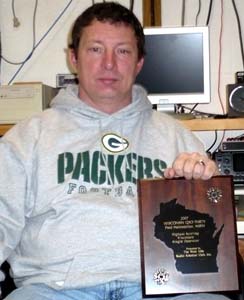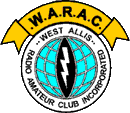|
 This year's running of the WIQP is right
around the corner. Some people are sure to get on every year and always have a blast. Other hams
either occasionally participate or have never given the WIQP a try. Here are ten good reasons why
you should fire up the radio on the second Sunday in March (1:00PM local time) and join in the
fun. This year's running of the WIQP is right
around the corner. Some people are sure to get on every year and always have a blast. Other hams
either occasionally participate or have never given the WIQP a try. Here are ten good reasons why
you should fire up the radio on the second Sunday in March (1:00PM local time) and join in the
fun.
It might be best to start off with a short description of what the WIQP is. This is our state
"QSO party" in which hams try to contact as many other stations as possible during the contest
period (7 hours on Sunday afternoon and evening in our case). Lots of other states have similar
events but ours is one of the best in terms of in-state and out-of-state activity. During the
WIQP, the rules for stations inside versus outside Wisconsin are slightly different. Hams
located in Wisconsin can contact stations anywhere for credit ("QSO points") while people
outside of the state only work WI stations. Each of the 72 counties in Wisconsin counts as a
score "multiplier" and for in-state participants other US states and Canadian provinces are
multipliers as well. The exchange is your county if in Wisconsin and your state/province if
outside. So the basic idea is to contact and accurately log as many stations as possible in as
many different counties/states/provinces as possible.
So - here are some things to think about:
1. You don't need a big station to do well.
I often hear people talk about how there's no point in getting involved in something like WIQP
or other contests because "everyone is running 3 KW amps into stacked beams" and the "little
guy" has no chance. The reality is that in an event like WIQP the ham with a typical small
station is in a very good position to do well. Most of the important contacts for Wisconsin
operators are made within a few hundred miles and local activity tends to favor the 80 and
40-meter bands. I have several antennas at my station but in the years that I've scored well
in WIQP most of these contacts were made on a basic 40m dipole hanging 20 to 25 feet off the
ground and fed with a long run of RG8/X. Most hams can manage an antenna like this even if
it's only up for the weekend of the contest. As for power, since the rules were changed
several years ago to include a power multiplier, very few people seem to be running more than
100 watts.
2. You don't need HF privileges or fast CW skills.
It is certainly true that most of the contacts that are available to you during the contest are
on the HF bands. That said, you may be surprised to see how many people you can find on VHF and
UHF. I know of a few VHF enthusiasts who focus their attention on those bands and have been quite
active in WIQP. This includes QSOs on FM as well as SSB. If you only have a 2m radio and a
vertical antenna you might want to hang around the FM simplex frequencies and see who you can
find (146.55 is usually good). Some years there is quite a lot of activity here. As for CW, there
are lots of folks that operate WIQP every year and don't use this mode at all. However, if you
really want to maximize your score you can't beat doing some CW since the rules state that each
contact in this mode counts more. If you tune around you'll find people at all different code
speeds on the bands calling CQ WIQP.
3. It's great practice for operating on Field Day.
There are an awful lot of hams that don't have a burning interest in HF operating but do like to
get on maybe once a year for ARRL Field Day with their buddies. As with many skills, when it
comes to being comfortable and proficient in front of a radio there is no substitute for
practice. If you want to be a little smoother at FD this year then consider putting in some time
during WIQP. You can practice your contest style exchanges, get familiar with a new radio or
logging software, or try out a new idea for a portable antenna. Several years ago I did a WIQP
"expedition" to a semi-rare county with a friend of mine from our FD group. We camped out and set
up a portable station and had a great time playing around in the snow. We were also able to try
out a few new tricks that helped our score in June.
4. You can help your favorite club.
Did you know that WIQP has a club competition? Is your club looking for a little organized
activity or a little more visibility within the state? Here's your chance. The more club
members you can get to submit logs the better your chances for winning the club title in WQIP.
This could also be a good reason to get together with other members. There are several entry
categories for multi-operator efforts. If you have an HF setup and others in your club don't,
invite them over and do a multi-op entry. This can really be a lot of fun. It can also be a
good opportunity to expose new hams to HF operating and contesting (see also no. 3 above). The
Ozaukee Radio Club came out on top in WIQP 2007. Who will be next to hold the title?
5. You can win certificates and awards.
Some folks like "wallpaper". If that's true in your case you should be aware that the WIQP
organizers provide very attractive "certificates of achievement" for a large number of entries.
The top scoring single operator also gets a beautiful engraved wooden plaque. Be the first in
your neighborhood to have one! Of course, getting on for WIQP is also a good way to check off
a few new states for your Worked All States (WAS) or grid squares for VUCC.
6. Rare Wisconsin counties are active.
Are you a "county hunter"? Lots of hams get hours of enjoyment from chasing and tracking QSOs
with counties throughout the US. It's kind of like taking the WAS award from ARRL to the
extreme! The object here is to make two-way radio contact with hams operating in every county in
every state. State QSO parties like WIQP are great for this in that since counties are
considered multipliers within the contest, rare counties are often put on the air. Also, don't
forget that WARAC sponsors the "Worked all Wisconsin Counties Award". The WIQP might be the
only time you're likely to hear some of them on the radio.
7. Say hello to old friends (and make some new ones).
One of my favorite things about the WIQP is the opportunity to say hello to old friends. A
number of hams that no longer live in Wisconsin make it a point to get on the air during WIQP
and check in for this very reason. There is a pretty consistent group of operators that show
up every year and after you do it a while you'll start to recognize a lot of callsigns. You're
also going to hear lots of people you know from the local clubs. Some ops tend to try to keep
it moving as fast as possible while others will take some time to "ragchew" and catch up a bit.
It is a "QSO party" after all which amounts to a great way to get as many Wisconsin hams and
interested others on the air at the same time.
8. Support amateur radio in Wisconsin.
The WIQP is really the only organized amateur radio event in which all hams in the state are
encouraged to get on the air and contact each other. The level of activity in the WIQP says a
lot about the state if the hobby in Wisconsin. Our QSO party has a well-deserved reputation
for being one of the best organized and attended. The level and quality of CW activity is also
often mentioned by those outside the Badger State. Get on the air and add your support.
9. Learn more about contesting.
Are you the kind of person that likes to keep score? If you like healthy competition and
amateur radio then contesting may be something you want to learn more about. State QSO parties
like WIQP are a great way to get your feet wet in contesting. The operating period is short,
the rules are simple, and the scoring structure favors low power stations with low antennas.
While activity levels are such that you'll be able to consistently make contacts at a pretty
good rate, they are not as high as in other domestic or DX contests when the entire band will
be packed from top to bottom with people CQing. Operators also tend to be a bit more laid back
in this situation. See how many QSOs you can manage in an hour, or think about ways to
maximize the number of multipliers you work. The WIQP is a great place to start thinking about
the strategy and tactics needed to maximize your score.
Contesting in general is probably the best way to develop a whole group of skills including
fast and accurate operating, knowledge of propagation, station design and optimization, etc.
You can always do something to put up a better score. Importantly, "better" can mean better
than the next guy you want to beat or, more often, just better than you did last year. Keeping
score and having everyone play by the same set of rules allows you to measure your progress as
an operator and quantify the effectiveness of your station.
10. Have fun!
The most important reason to get on for WIQP is that it loads of fun. There's something in it
for everybody from the hard-core contester to the casual mobile op with a 2m FM rig taking the
kids to their afternoon activities. If you've never tried making contacts in the WIQP I hope
you will give it a shot this year. If you've done it in the past but have gotten out of the
habit then I hope you get on as well - if only to give your club a few more points and to say
hello to some old friends.
You can read about the WIQP on the WARAC web site (http://www.warac.org). All the information you need to
participate as well as the results for prior year's events can be found there. I hope to put you
in the log! CU on the bands.
73 de N9FH
|



